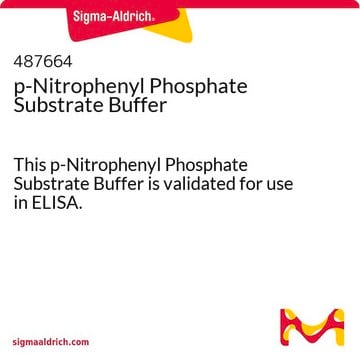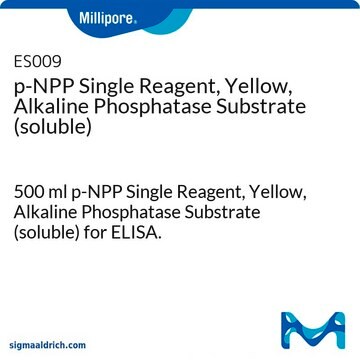おすすめの製品
詳細
p-Nitrophenyl phosphate is the most common substrate for alkaline phosphatase-based ELISA assays. Hydrolysis of the phosphate ester liberates p-nitrophenol, a soluble, yellow chromogen that can be measured spectrophotometrically at 405 nm (ε = 1.83 x 104 M-1cm-1). As the reaction is linear, kinetic assays can be performed. Endpoint determinations can also be performed by stopping the reaction with strong base and measuring the absorbance at 405 nm. This p-NPP preparation is a stable, convenient, liquid concentrate in a proprietary solvent.
p-Nitrophenyl phosphate supplied as a 50X concentrate (0.19 mol/l). For use with p-NPP Substrate Buffer, Cat. No. 487664.
Excellent substrate for alkaline phosphatase-based ELISA assays. Produces yellow soluble end product that can be read at 405 nm to 410 nm. Both kinetic and endpoint determinations can be performed. Supplied as ready-to-use. A ready-to-use diluent is available separately (Cat. No. 487664).
This p-Nitrophenyl Phosphate is validated for use in ELISA.
アプリケーション
ELISA
生物化学的/生理学的作用
Primary Target
Substrate for alkaline phosphatase-based ELISA assays
Substrate for alkaline phosphatase-based ELISA assays
Product does not compete with ATP.
警告
Toxicity: Standard Handling (A)
物理的形状
Supplied as a 50X concentrate.
再構成
Discard if solution turns bright yellow or becomes turbid.
その他情報
Functionality check performed on the final product in ELISA.
Suggested procedure for use of p-NPP in alkaline phosphatase-based ELISAs:
1. Prepare 1X p-NPP Substrate Solution: To 39 parts dH2O add 1 part 50X p-NPP Concentrate and 10 parts p-NPP Substrate Buffer (Cat. No. 487664). Mix well and store protected from light. This diluted reagent is suitable for up to 10 h after preparation.
Note: Cat. No. 487664 is an AMP (2-amino-2-methyl-1-propanol)-based buffer. Other buffers, e.g. diethanolamine (DEA)-based and 2-amino-2-methyl-1,3-propanediol (AMPD)-based, may also be employed.
2. Complete all required incubations with antibodies and alkaline phosphatase-labeled probes.
3. Wash plate wells at least 4 times with Tris-buffered saline (TBS) containing 0.1% Tween®-20 detergent. DO NOT USE PHOSPHATE BUFFERS; inorganic phosphate is a potent inhibitor of alkaline phosphatase.
4. After the final wash, shake and blot all residual buffer from the wells.
5. Add 100 µl of 1X p-NPP Substrate Solution (prepared in Step 2) to each well and incubate for 15-60 min. (If a kinetic study is desired, readings at 405 nm may be taken at intermediate intervals).
[Note: Optimal incubation times may vary depending on the amount of enzyme present. If color develops too quickly, dilution of the probe, antibody, or alkaline phosphatase-labeled reagent may be required.]
6. Stop the reaction by adding 100 µl 1 N NaOH.
7. Read absorbance at 405 nm.
Note: Variations in time, reagent volumes, and temperature may require further standardization by the user.
Suggested procedure for use of p-NPP in alkaline phosphatase-based ELISAs:
1. Prepare 1X p-NPP Substrate Solution: To 39 parts dH2O add 1 part 50X p-NPP Concentrate and 10 parts p-NPP Substrate Buffer (Cat. No. 487664). Mix well and store protected from light. This diluted reagent is suitable for up to 10 h after preparation.
Note: Cat. No. 487664 is an AMP (2-amino-2-methyl-1-propanol)-based buffer. Other buffers, e.g. diethanolamine (DEA)-based and 2-amino-2-methyl-1,3-propanediol (AMPD)-based, may also be employed.
2. Complete all required incubations with antibodies and alkaline phosphatase-labeled probes.
3. Wash plate wells at least 4 times with Tris-buffered saline (TBS) containing 0.1% Tween®-20 detergent. DO NOT USE PHOSPHATE BUFFERS; inorganic phosphate is a potent inhibitor of alkaline phosphatase.
4. After the final wash, shake and blot all residual buffer from the wells.
5. Add 100 µl of 1X p-NPP Substrate Solution (prepared in Step 2) to each well and incubate for 15-60 min. (If a kinetic study is desired, readings at 405 nm may be taken at intermediate intervals).
[Note: Optimal incubation times may vary depending on the amount of enzyme present. If color develops too quickly, dilution of the probe, antibody, or alkaline phosphatase-labeled reagent may be required.]
6. Stop the reaction by adding 100 µl 1 N NaOH.
7. Read absorbance at 405 nm.
Note: Variations in time, reagent volumes, and temperature may require further standardization by the user.
法的情報
CALBIOCHEM is a registered trademark of Merck KGaA, Darmstadt, Germany
TWEEN is a registered trademark of Croda International PLC
保管分類コード
12 - Non Combustible Liquids
WGK
WGK 3
引火点(°F)
Not applicable
引火点(℃)
Not applicable
適用法令
試験研究用途を考慮した関連法令を主に挙げております。化学物質以外については、一部の情報のみ提供しています。 製品を安全かつ合法的に使用することは、使用者の義務です。最新情報により修正される場合があります。WEBの反映には時間を要することがあるため、適宜SDSをご参照ください。
労働安全衛生法名称等を表示すべき危険物及び有害物
名称等を表示すべき危険物及び有害物
労働安全衛生法名称等を通知すべき危険物及び有害物
名称等を通知すべき危険物及び有害物
Jan Code
487663-10ML:
487663-ML:
試験成績書(COA)
製品のロット番号・バッチ番号を入力して、試験成績書(COA) を検索できます。ロット番号・バッチ番号は、製品ラベルに「Lot」または「Batch」に続いて記載されています。
この製品を見ている人はこちらもチェック
ライフサイエンス、有機合成、材料科学、クロマトグラフィー、分析など、あらゆる分野の研究に経験のあるメンバーがおります。.
製品に関するお問い合わせはこちら(テクニカルサービス)








